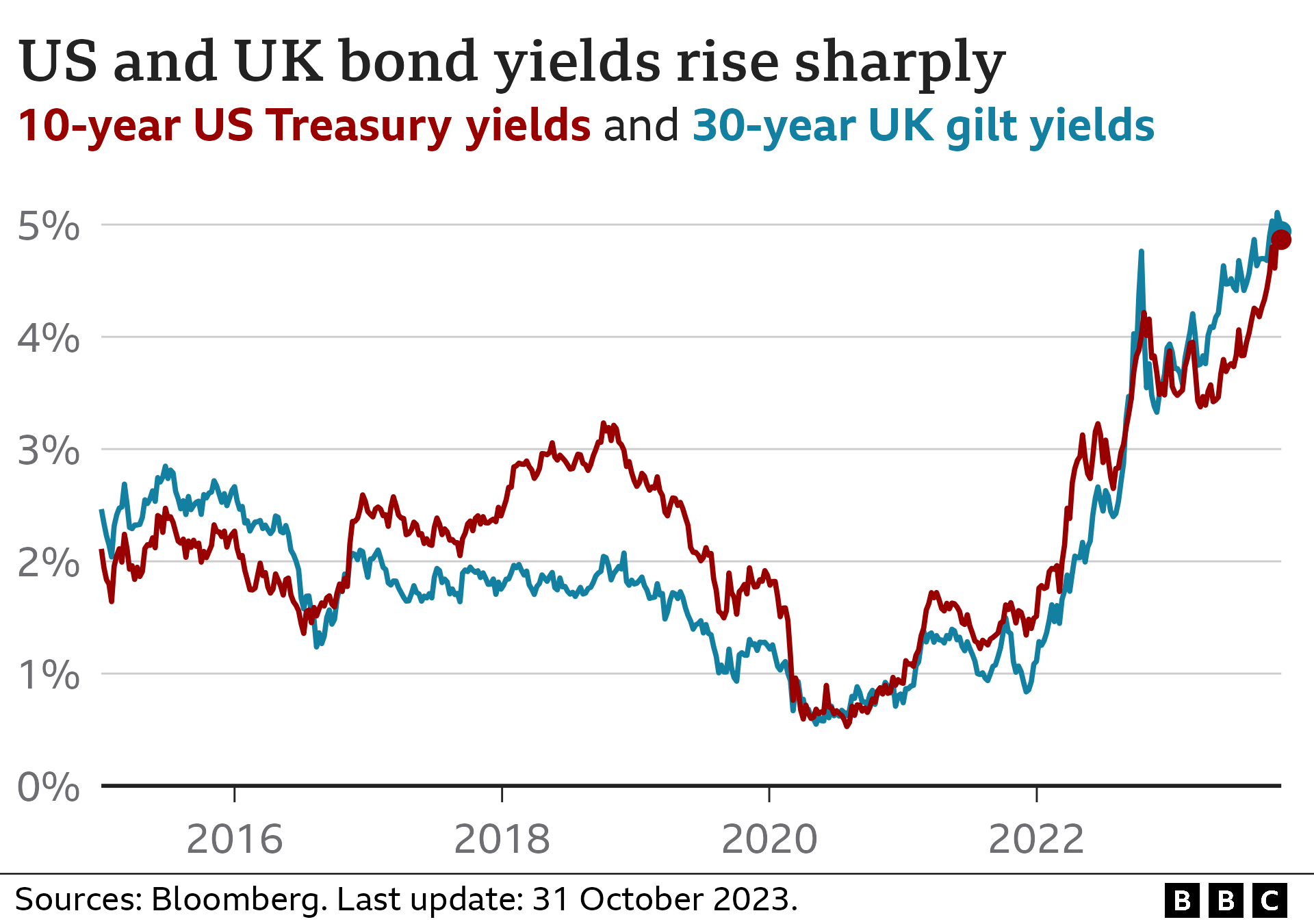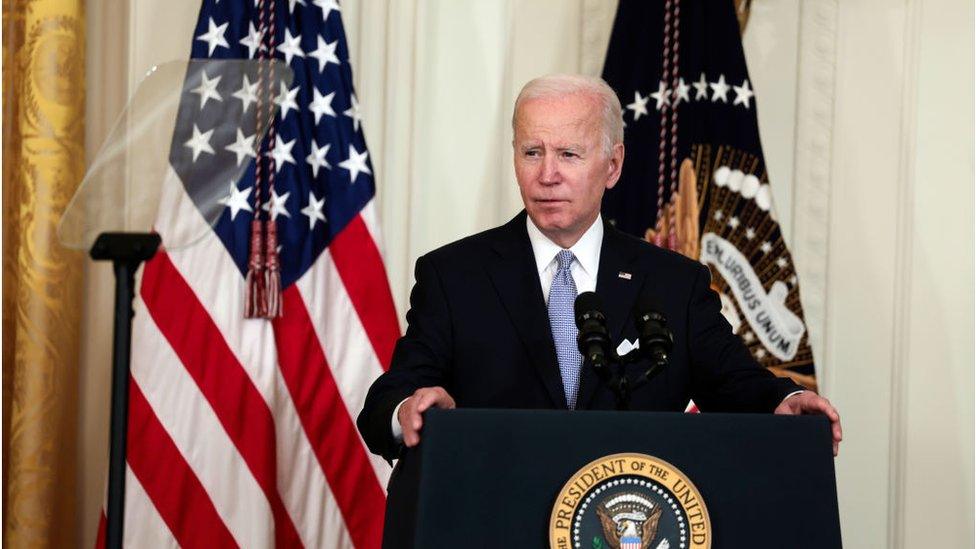Bonds: The flashing warning sign that is worrying investors
- Published

It's not something your friends are likely to be talking about down the pub but in the City there's something fund managers and investors are increasingly worried about.
Bond markets.
They are falling and have been for some time.
It is a flashing warning sign about the state of the UK and US economies and may affect the costs of our loans and mortgages.
So how worried should we be?
What is a bond?
Governments borrow money by selling financial products called bonds. A bond is a promise to pay money in the future. Most require the borrower to make regular interest payments over the bond's lifetime.
UK government bonds - known as gilts - are normally considered very safe investments, with little risk the money will not be repaid. US government bonds - known as Treasuries - are also considered very safe.

What's going on in the bond market?
Over the last year or so, there has been a sell-off of government bonds on global markets that is having wider ramifications.
It comes as central banks warn that inflation - the rate at which prices rise - is likely to stay higher for longer than previously expected.
Since 2021, central banks have repeatedly put up interest rates to try to tame inflation, lifting them from close to zero to where they are now: 5.25% in the UK and 5.25%-5.50% in the US.
And when official rates rise, the yields on government bonds also tend to go up to attract buyers, driving up borrowing costs for governments and consumers in the process.
Yields on benchmark 10-year US Treasuries topped 5% in October - their highest level since just before the 2007 financial crisis. In the UK, 30-year gilt yields hit a 25-year high of 5.115% earlier in the month, with similar moves seen elsewhere in Europe.
As yields rise, investors tend to dump the older bonds they currently hold in favour of newly issued ones that pay higher rates.
As a result, bond prices tend to fall which affects anyone who owns these assets - hence the flashing lights we are seeing in the markets.
How could this affect me?
Government bond yields are used as a guide for setting the rates on everyday loans and mortgages, which have shot up over the last few years.
Average US mortgage rates hit a two-decade high of 8% last month, squeezing borrowers. In the UK, the rate on an average five-year fixed residential deal was 5.87% as on 31 October, down slightly from levels seen earlier this year but still high compared with a few years ago.

Bond yields are used as a guide for setting rates on home loans
Rising bond yields are also putting pressure on governments.
That's because the higher yields go, the more governments have to pay back in debt interest, which may leave them with less to spend on other things.
It is likely to impact whichever party wins the UK general election tipped for next year, says Simon French, a managing director at investment bank Panmure Gordon.
"The higher bond rates go, the more interest that has to be repaid, the less there is for public services such as health and education," he says.
Could higher borrowing costs push countries over the edge?
That is highly unlikely, says Russ Mould, investment director at AJ Bell. The UK has never defaulted on its debts (although in 1672 England did so) nor has the US.
However, he says investors are feeling slightly more nervous about the "manageability" of these countries' debts after years of heavy government spending on things like the 2007-08 financial crisis, the Covid pandemic and the Ukraine war.
America's total debt stands at $33.6 trillion (£27.6tn) - up from $9tn in 2007. In the UK it's risen to £2.5tn from £700bn over that time.
The more debt interest countries have to pay, the harder, theoretically, it may be for them to repay what they owe investors.

The Fitch ratings agency downgraded US government debt from AAA to AA+ in August
What is the risk to investors?
The immediate risk is from the sharp fall in bond prices, which is bad news for investors and companies that hold these normally stable assets as collateral on their balance sheets.
Earlier this year, Silicon Valley Bank imploded after the value of bonds it held on its balance sheet collapsed. And some UK pension funds got into difficulties when the government's mini-budget sparked turmoil on UK bond markets in 2022, forcing the Bank of England to step in.
Mr French expects we'll see more "unanticipated fallout" as the bond sell-off continues but it won't become a systemic risk to the global economy.
"We are certainly not in the territory of 2008-09 or at the start of the pandemic when there was proper fear out there. But there is worry."
What about the wider economy?
The Bank of England and the US Federal Reserve both think a recession can be avoided in their respective countries.
But Mr Mould doesn't rule it out, adding that markets fear "we will end up with painful government debt or painful inflation" over the next few years.
The hope, he says, is that the UK and US central banks will steer their respective economies towards a "soft landing" by bringing down inflation without hurting the economy.
"They got us through Covid and the energy price shock, and markets are hoping they can do it again."
The big unknown is whether rising geopolitical tensions will spill over and make a bad situation worse.
Russia's invasion of Ukraine hit economies around the world as global energy prices spiked and governments were forced to intervene to help households.
Now, Middle East tensions are rising as Israel expands ground operations in Gaza following the 7 October Hamas attacks that killed 1,400 Israelis with 239 people kidnapped as hostages. Thousands of Palestinians have also been killed.
Meanwhile, an attack on Taiwan by China remains a real possibility.
Such events could cause even more economic disruption.
Related topics
- Published4 October 2023

- Published20 September 2023

- Published29 September 2022

